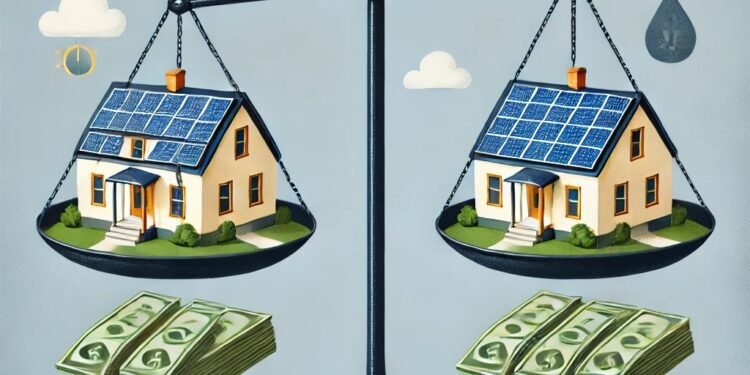Installing solar panels at home is a significant investment, but it can offer substantial benefits in terms of energy savings, environmental impact, and energy independence. Homeowners who are considering solar energy often weigh the upfront costs against the long-term financial and environmental gains. Here’s a detailed cost-benefit analysis to help you decide whether solar panels are the right choice for your home.
1. The Initial Costs of Installing Solar Panels
One of the biggest barriers to solar adoption is the initial installation cost. Here’s what you can expect:
• Equipment Costs: The cost of the solar panels themselves can vary based on the size of the system, panel efficiency, and brand. On average, the cost of a solar system ranges between $15,000 to $30,000 before incentives.
• Installation Costs: Labor costs for installing solar panels typically range between $2,000 to $5,000 depending on the complexity of the installation.
• Permitting and Inspections: Some homeowners may also incur costs for local permits and inspections, which can add a few hundred dollars to the overall price.
2. Financial Incentives and Rebates
Many governments offer financial incentives to reduce the upfront cost of solar installations:
• Federal Tax Credits (USA): Homeowners in the United States can take advantage of the Federal Solar Investment Tax Credit (ITC), which allows you to deduct a portion of your solar installation cost from your federal taxes. As of 2024, the ITC covers 30% of the installation cost.
• State and Local Incentives: Many states and municipalities also offer additional rebates or tax incentives, further lowering the cost.
• Net Metering: Homeowners who install solar panels may be eligible for net metering, a system in which excess electricity generated by your solar panels is sent back to the grid, and you receive credits on your utility bill.
3. Long-Term Savings on Energy Bills
The main financial benefit of installing solar panels is the long-term reduction in energy costs:
• Reduced Electricity Bills: By generating your own electricity, you reduce or eliminate your monthly utility bill. On average, homeowners save between $600 to $2,000 per year, depending on energy usage and the size of the solar system.
• Return on Investment (ROI): The return on investment for solar panels is typically realized within 7 to 10 years. After this period, the energy savings often exceed the initial cost, allowing homeowners to benefit from free electricity for the remaining lifespan of the system, which is usually around 25 years.
4. Environmental Benefits
Solar energy is a clean and renewable source of power. By installing solar panels, homeowners contribute to reducing greenhouse gas emissions:
• Lower Carbon Footprint: The average home solar system can reduce carbon dioxide emissions by approximately 3 to 4 tons annually, equivalent to planting over 100 trees per year.
• Energy Independence: By generating your own electricity, you reduce dependence on fossil fuels and grid electricity, contributing to a more sustainable future.
5. Potential Drawbacks
While solar energy offers many benefits, there are some potential drawbacks to consider:
• Upfront Costs: Despite financial incentives, the upfront cost of solar installation may still be high for some homeowners.
• Location and Sunlight Availability: The effectiveness of solar panels depends on your location and the amount of sunlight your home receives. Homes in regions with less sunlight may not see the same financial returns as those in sunnier areas.
• Maintenance: Although solar panels require minimal maintenance, occasional cleaning and potential repairs may be needed over the 25-30 year lifespan of the system.
6. Increasing Home Value
Installing solar panels can also increase the resale value of your home:
• Property Value Boost: Studies have shown that homes with solar panels can sell for an average of 4% more than homes without them, making it a valuable long-term investment if you plan to sell your home in the future.
Conclusion: Is Solar Energy Worth It?
For many homeowners, the benefits of solar panels outweigh the costs, especially when considering long-term savings and environmental impact. Financial incentives and decreasing installation costs make solar energy more accessible, and the investment pays off over time with reduced electricity bills and increased home value.
However, homeowners should carefully assess their energy needs, location, and budget before making the decision. In areas with abundant sunlight and high electricity costs, solar energy can be a particularly worthwhile investment.










































